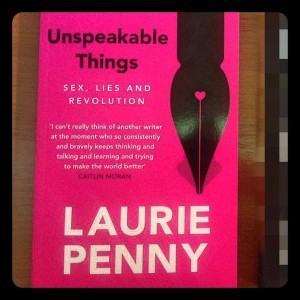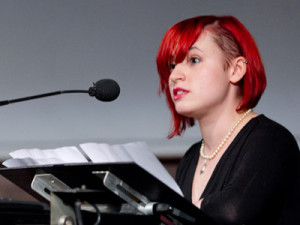“What the Nation Really Needs to Know: The JNU Nationalism Lectures”
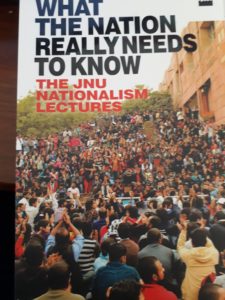 On 12 February 2016, the elected president of the Jawaharlal Nehru University Students’ Union ( JNUSU) , Kanhaiya Kumar, was picked up by the police from the campus. The arrest of two more students followed. During the three weeks that the arrested students, including Kanhaiya Kumar, remained in jail before securing bail, the JNUSU president, teachers and media persons faced physical attacks and intimidation at the court premises, even in the presence of the police. All this was perpetuated in the name of ‘nationalism’.
On 12 February 2016, the elected president of the Jawaharlal Nehru University Students’ Union ( JNUSU) , Kanhaiya Kumar, was picked up by the police from the campus. The arrest of two more students followed. During the three weeks that the arrested students, including Kanhaiya Kumar, remained in jail before securing bail, the JNUSU president, teachers and media persons faced physical attacks and intimidation at the court premises, even in the presence of the police. All this was perpetuated in the name of ‘nationalism’.
…With each passing day, more and more citizens came out to ‘Stand with JNU’ to defend the ‘freedom of expression’ and ‘autonomy of academic institutions’. These two became the rallying points for the protest movement that continues in one form or the other.
( From the Acknowledgements to the book)
What the Nation Really Needs to Know: The JNU Nationalism Lectures consists of the set of public lectures 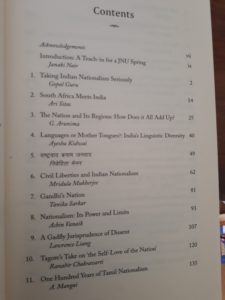 organised by the JNU Teachers Association (JNUTA) on various perspectives on nationalism and on different meanings of freedom to defend the heterogenous intellectual tradition that is today under threat. Hundreds of students and teachers from different disciplines gathered in the evening at the protest site, called Freedom Square, to listen to scientists, philosophers and social scientists speaking on issues of nationalism, academic autonomy and freedom of speech. Some of the contributors were Shashi Tharoor, Prabhat Patnaik, Gopal Guru, Achin Vanaik, Tanika Sarkar, Lawrence Liang, A. Mangai, G. Arunima, Nivedita Menon, Suvir Kaul, Jayati Ghosh et al.
organised by the JNU Teachers Association (JNUTA) on various perspectives on nationalism and on different meanings of freedom to defend the heterogenous intellectual tradition that is today under threat. Hundreds of students and teachers from different disciplines gathered in the evening at the protest site, called Freedom Square, to listen to scientists, philosophers and social scientists speaking on issues of nationalism, academic autonomy and freedom of speech. Some of the contributors were Shashi Tharoor, Prabhat Patnaik, Gopal Guru, Achin Vanaik, Tanika Sarkar, Lawrence Liang, A. Mangai, G. Arunima, Nivedita Menon, Suvir Kaul, Jayati Ghosh et al.
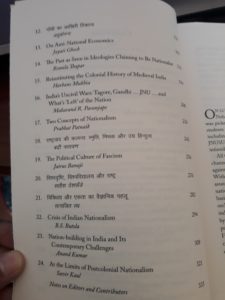 The lectures were uploaded on YouTube and the transcripts were published by HarperCollins India. Interestingly the lectures were printed as they were delivered — in English or Hindi. Also for a seminal collection such as this the paperback is reasonably priced at Rs 299 making it within accessible reach of many readers. There are many fascinating lecturers. One of those invited was eminent historian and founder members of JNU — Prof. Romila Thapar. She spoke on ” The Past as Seen as Ideologies Claiming to be a Nationalist” ( 6 March 2016).
The lectures were uploaded on YouTube and the transcripts were published by HarperCollins India. Interestingly the lectures were printed as they were delivered — in English or Hindi. Also for a seminal collection such as this the paperback is reasonably priced at Rs 299 making it within accessible reach of many readers. There are many fascinating lecturers. One of those invited was eminent historian and founder members of JNU — Prof. Romila Thapar. She spoke on ” The Past as Seen as Ideologies Claiming to be a Nationalist” ( 6 March 2016).
Here is an extract:
…the reading and interpretation of the past requires a trained understanding of the sources and a sensitivity to understanding what has been written. The political requirements of today cannot be imposed on the history of the past. To maintain a generalized statement that the period of the last thousand years was one of the victimization and enslavement of the Hindus by the Muslims is historically unacceptable. This kind of generalization feeds communal nationalism. That is why I am cautioning against it. Unfounded generalizations have to be replaced by analytical history.
At the time of Independence and soon after ( when none of you were born!), we had no problems defining nationalism and the definition was widely accepted. Nationalism meant declaring every Indian as an equal citizen of India and upholding the rights of every citizen to that equality. Today, efforts are being made to obfuscate it. Nationalism draws on reliable history and not on the contorted history that feeds communal ideologies. Reliable history demands critical enquiry which, as we all know, is essential to the advancement of knowledge. It is expected of a university to critically enquire into what publicly may be claimed. Nationalism gives an identity to the citizen. The citizen is pre-eminent but no citizen or group of citizens can claim superiority over others as citizens, irrespective of what may be the basis of the claim. Citizenship is founded on the equality of all and the equal rights of all. Incisive debates on this are part of the nationalist enterprise, and this is an ongoing enterprise in the relationship between history and nationalism. Universities are the obvious places for such debates. We in India have had a head start due to our Constitution and with our commitment to making the nation a secular democracy. This is what we are committed to as Indians and what we are committed to when we became independent, and this commitment has to continue as the hallmark of our nationalism.
This is a fascinating anthology which will be a keeper. Amazon India has termed it as a “bestseller” but at the time of writing print editions of the book were unavailable on the website. Anyhow it is worth possessing and mulling over the lectures delivered. Ideas can only begat more ideas — for better or for worse, only time will tell.
12 March 2017

